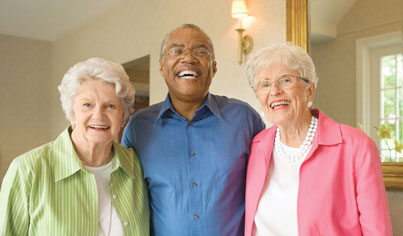12 Things Anyone Can Do to Help Prevent Elder Abuse

World Elder Abuse Awareness Day: Sunday, June 15th
“Our society must make it right and possible for old people not to fear the young or be deserted by them,
for the test of a civilization is the way that it cares for its helpless members.”
— Pearl S. Buck (1892-1973)
In 2012, the UN designated June 15 World Elder Abuse Awareness Day (WEAAD). The day aims to focus global attention on the problem of physical, emotional, and financial abuse of elders. It also seeks to understand the challenges and opportunities presented by an aging population, and brings together senior citizens, and their caregivers, national and local government, academics, and the private sector to exchange ideas about how best to reduce incidents of violence towards elders, increase reporting of such abuse, and to develop elder friendly policies.
World Elder Abuse Awareness Day was initially launched on June 15, 2006 by the International Network for the Prevention of Elder Abuse and the United Nations World Health Organization. Then on March 9, 2012 the UN General Assembly resolution 66/127 established June 15th as a UN International Day. The purpose of the WEAAD is to encourage communities to recognize the problem of elderly abuse, and for countries to create policies that foster respect for elders and provide them the tools to continue to be productive citizens. World Health Organization data suggests that 4 to 6 percent of elderly suffer from some form of abuse, a large percentage of which goes unreported.
On World Elder Abuse Awareness Day, individuals and organizations from across the world are urged to raise awareness of the various types of abuse to which older individuals are subjected. If you’re looking for ways to commemorate the day, the Administration for Community Living provides information, tools, and resources.
12 ways to prevent elder abuse
-
Learn the signs of elder abuse and neglect.
-
Call or visit an elderly loved one and ask how he or she is doing.
-
Provide a respite break for a caregiver.
-
Ask your bank manager to train tellers on how to detect elder financial abuse.
-
Ask your doctor to ask you and all other senior patients about possible family violence in their lives.
-
Contact your local Adult Protective Services or Long-Term Care Ombudsman to learn how to support their work helping at-risk elders and adults with disabilities.
-
Organize a “Respect Your Elders” essay or poster contest in your child’s school.
-
Ask your religious congregation’s leader to give a talk about elder abuse at a service or to put a message about elder abuse in the bulletin.
-
Volunteer to be a friendly visitor to a nursing home resident or to a homebound senior in your neighborhood.
-
Send a letter to your local paper, radio or TV station suggesting that they cover World Elder Abuse Awareness Day (June 15) or Grandparents Day in September.
-
Dedicate your bike-a-thon/marathon/other event to elder mistreatment awareness and prevention.
- Join the Ageless Alliance. Ageless Alliance connects people of all ages, nationwide, who stand united for the dignity of older adults and for the elimination of elder abuse. You can join (it’s free) and get involved at agelessalliance.org.
To learn more about seniors, as well as elder abuse and what can be done to prevent it, visit the Administration on Aging website. Also note that in addition to the WEAAD, the UN also observes an International Day of Older Persons day on October 1 every year to recognize the contributions of older persons and to examine issues that affect their lives. Mark the date on your calendar!
- - - - - - - - - - - - - - - - - - - - - - - - - - - - - - - - - - - - - - - - - - - - - - - - - - - - - - - - - - - - - - -
If you’re seeking home care, hospice, or a senior living residence for yourself or a loved one, visit alternativesforseniors.com. There, you can find a wealth of information about senior apartments, independent-living, assisted-living, Alzheimer’s specialty care, and continuing-care communities.
BLOG Date: Thursday, June 12, 2014
Writer: Ryan Allen